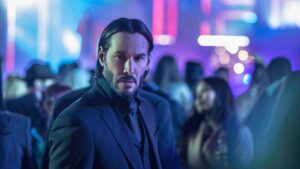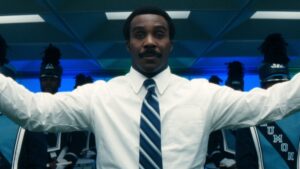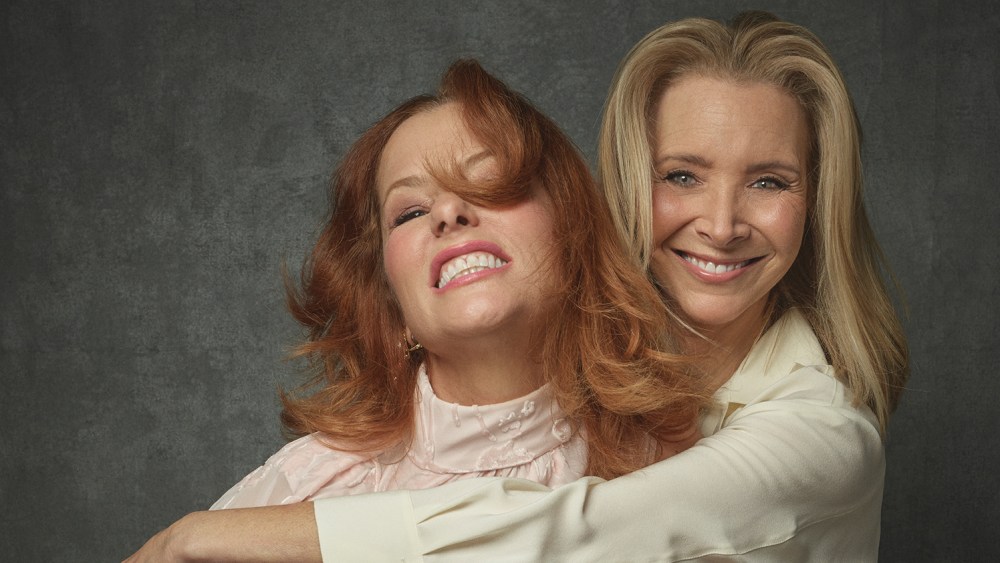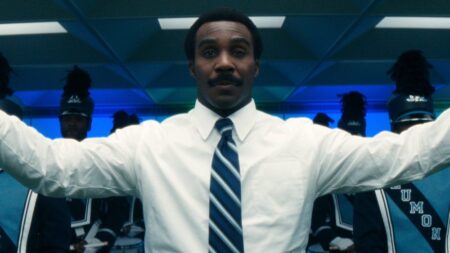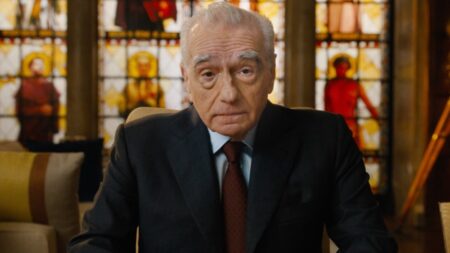Parker Posey and Lisa Kudrow first met making “Clockwatchers,” a 1997 indie comedy in which they play temps in a dull office. Back then, Posey was establishing a reputation as a burgeoning legend of independent film who would soon enough cross over in projects like “You’ve Got Mail” and “Scream 3,” while Kudrow was already a superstar thanks to her role as the quirky Phoebe Buffay on “Friends.”
Both have experienced cult TV fame in the years since — Posey as Jack’s nemesis on “Will & Grace,” Kudrow as a washed-up actress-turned-reality star on “The Comeback” — and both put their stamp on projects this past season. Posey drawled her way through the role of wealthy matriarch Victoria Ratliff on the HBO franchise “The White Lotus,” while Kudrow delivered a sensitive, painful performance as Lydia Morgan, a grieving mother who believes her late son communicates with her through flickering lights on Netflix’s real estate thriller “No Good Deed.”
Parker Posey: We were both Nora Ephron ladies back in the ’90s.
Lisa Kudrow: I know.
Posey: What did you do with Nora?
Kudrow: I did “Hanging Up,” which she wrote with [her sister] Delia. Diane Keaton directed it. We had great food every day because Nora was around. And then I did another movie that Nora directed, and John Travolta was in it — “Was in it?” How’s that? It was a John Travolta movie, and I was in it.
Posey: And he was an angel or something, right?
Kudrow: No, that was “Michael,” and that was a great movie. This one was disappointing. I remember Nora called me once — I was working on “Friends” — and she went, “When are you finished with this show? Why do you keep doing it?” I was like, “Well, some good reasons.”
Posey: I remember she came up to me once and said, “Just be funny,” and that was the note.
Kudrow: It’s a good note!
Posey: I’m such a big fan of yours, and one of my most favorite things ever is “The Comeback.” How did it start in your brain?
Kudrow: There were no “Real Housewives” yet. But there was “The Amazing Race” and “Survivor,” which I thought, “Well, this is the end of civilization.” Because on “Amazing Race” — I watched a couple — the woman is eating very spicy stuff and vomiting on camera while her husband is screaming at her. She’s crying and vomiting, and I went, “Oh, this is it.”
Posey: “How can I top that?”
Peggy Sirota for Variety
Kudrow: “This is the end.” And then I thought, “What if you don’t have to feel bad for a regular person — what if it’s an actress?” It was near when “Friends” was just about done. And I just thought, “That would be really fun,” just throwing yourself into humiliation.
Posey: It’s such an interesting edge to walk, because as a viewer, I felt for her, and I also rooted for her.
Kudrow: For me, that was all the Christopher Guest movies you did.
Posey: Chris Guest would say, “This is not too far from the truth,” and just walk away. And then you play the scene. It’s the things that you’re not really thinking about that aren’t planned — that’s what was so liberating about those movies. I felt so spoiled: You go in and lock into the other person and just trust them.
Kudrow: I know you were on some multi-camera sitcoms. How was that for you? Because there’s something so much more regimented about that.
Posey: It’s like tap dancing and really having to make that step. It’s not exactly formulaic, but it’s hitting some kinds of notes. I would say stuff on “Will & Grace,” and people would laugh, and I didn’t get it. I didn’t think it was funny.
Kudrow: Was it a joke that they had written?
Posey: Maybe. Yeah, I think so.
Kudrow: That happens sometimes.
Posey: It was very athletic.
Kudrow: They’re always throwing new things at you. All of us got new things as we were doing it.
Posey: It was really fun, right? Did it feel like a sport to you?
Kudrow: It became fun. It was fun the whole time because the cast had fun. Phoebe was so far from who I was as a human being, it was work — I needed to justify everything she was saying in my head so that it felt like she meant it and it was real to her. It was a lot of work. I remember Season 2 or 3, I went, “Oh my God, I’m not doing the work.” And LeBlanc went, “What’s the matter with you? You’re her. You don’t have to.”
Posey: You’re like, “But I want to work.”
Kudrow: The worst thing was wanting to be a good student. That’s what hurt me the most.
Posey: I like doing my homework too. When I read “The White Lotus” and it was so well written … I don’t know how he did it, but Mike White wrote those eight episodes, and really, they just fly.
We’ve both been doing this for 30 years, right?
Kudrow: Yeah.

Peggy Sirota for Variety
Posey: It was such a gift to have this middle-aged woman at this time in my career — to be this Southern woman. I was reading Tennessee Williams in junior high, so I just ate it up.
Kudrow: Did you have a point of reference for Victoria?
Posey: My dad loved William Faulkner. He was a really big reader. He loved Flannery O’Connor and all those Gothic tales. And my mom’s mother dressed like a movie star; she’d go to Neiman Marcus and look at the things she liked, and she’d go home and make them herself.
Kudrow: I think my favorite thing in the whole season was asking Victoria, “What if we didn’t have anything?” And the answer was the most honest thing I’d ever seen and made me respect her. Not respect her —
Posey: I know what you mean. When I read the line, that hit me the most out of the eight episodes, and I knew exactly how to say it. There’s such a cadence. A lot of people like to improvise and add things. But when things are really tight, I love how it sounds.
Would you enter the “White Lotus” world?
Kudrow: Work with Mike White? Yes. I love Mike White. I’ve hung out with him at a party.
Posey: He gets around.
Kudrow: He’s social. And “Brad’s Status” was my favorite movie that year. I emailed him to let him know, because I had to — it was so good, I had to. I don’t do that a lot.
Posey: Oh, Lisa, you should be in Season 4. If there’s a big enough TikTok campaign, then it’ll happen.
Kudrow: Because that’s how it works. No, it doesn’t.
Posey: It doesn’t. Because who knows what Mike White is writing or where these stories are going to go?
Kudrow: And I might not be his cup of tea, which is allowed to happen too. But I do get nervous about inhabiting things that are too dark; I try to avoid that. But you didn’t really have to, except for the scenes where your head’s blown off. But it’s pretend.
Posey: I really felt for mothers when I played this role.

Peggy Sirota for Variety
Kudrow: Right. It’s a whole other dimension.
Posey: I realized that mothers are shaped by their family and shaped by the man. So I got to go into the patriarchal system of women who are not being authentic. She has a distorted point of view of her life, and it’s been enabled.
Kudrow: A family has its own culture. We all grew up in one.
Posey: And that’s what’s so great about good writing is that it doesn’t judge, and it expands the way you look at —
Kudrow: It didn’t feel like it was judging so much this time — except of course it was, because they were at a White Lotus.
Posey: Mike is an actor too. He’s a really interesting guy. He was on “Survivor.” And “The Amazing Race” twice.
Kudrow: Oh, twice on “Amazing Race”? Wow. Likes to punish himself.
Posey: And then he decides to do a season in Thailand. It felt like an experiment, to work that long so far away in an exotic place. It was such a gift when you’re out of your element, you know?
Kudrow: We worked on “Clockwatchers.”
Posey: That’s where we first met. Jill and Karen Sprecher …
Kudrow: They wrote it, and Jill directed it. So Jill would come over and whisper a note to you; they’ve got their secrets. And the whole thing was about not trusting each other and trust and secrets.
Posey: Well, she was very shy. Do you remember the first day of work, she said “Cut!” instead of “Action!”
Kudrow: She was fantastic. But I thought everyone was smart and knew what they were doing more than I did. So when she would whisper, I would think, “Oh my God, she’s creating the same atmosphere.” Because you’re like, “What’s she saying?”
“Clockwatchers” had a certain culture on the set. Does Mike do that, consciously or unconsciously, also?
Posey: Oh, I think every director does that. That’s the whole mystique: You have to be a puppet taking shape by the projections that are happening around you.
Kudrow: I always feel that there are a lot of different levels that are happening that you’re not even conscious of in the choices you make as an actor. And then you see it. It feels like, “Oh, I wasn’t even aware that I was doing that.”
Posey: It can be really slippery. And then some people, you try to make sense of it, and you’re just in it. With Victoria, I was like, “Is Tim taking those pills?” Does she know that he’s taking pills? I’m playing denial, and that took me a while. I even talked to Mike: “Does she know?”
Kudrow: How does she not know?
Posey: She does know. Of course she knows. She’s been married to him for 30 years.
Kudrow: Did he say that?
Posey: No. But they give that room for you to be in that state. I really love denial — what people are picking up on in their instincts, what they choose to reveal to their loved ones.
Which is what you’re doing in “No Good Deed.”
Kudrow: I don’t think she wanted to poke at how her marriage is going. She knew who her husband was; he wasn’t a big talker about emotions. But then they’ve suffered a real tragedy where talking would’ve been good. And the whole time I was so keenly aware that she couldn’t do grief counseling.
Posey: No.
Kudrow: She couldn’t talk to a therapist about it. She was on her own. And it’s so destructive.
Posey: A dark night of the soul.
Kudrow: My first question when I met Liz Feldman, who created the show and wrote it, was “When the lights flicker, is that real? Or are you saying it’s not real?” And she said, “I do think that happens.” I went, “OK, then I’m in,” because I fully think that happens.
Posey: It does happen. It happens in my house.
Kudrow: I’ve seen it happening. My big, important question was “Are you going to call bullshit on …”
Posey: On spirit?
Kudrow: And Lydia needs it. And that was my first question because I was going to, honestly, think twice.
Posey: We don’t need glib.
Kudrow: We need magic.
Production: BAUIE+RAD; Production Design: Francisco Vargas
Read the full article here

